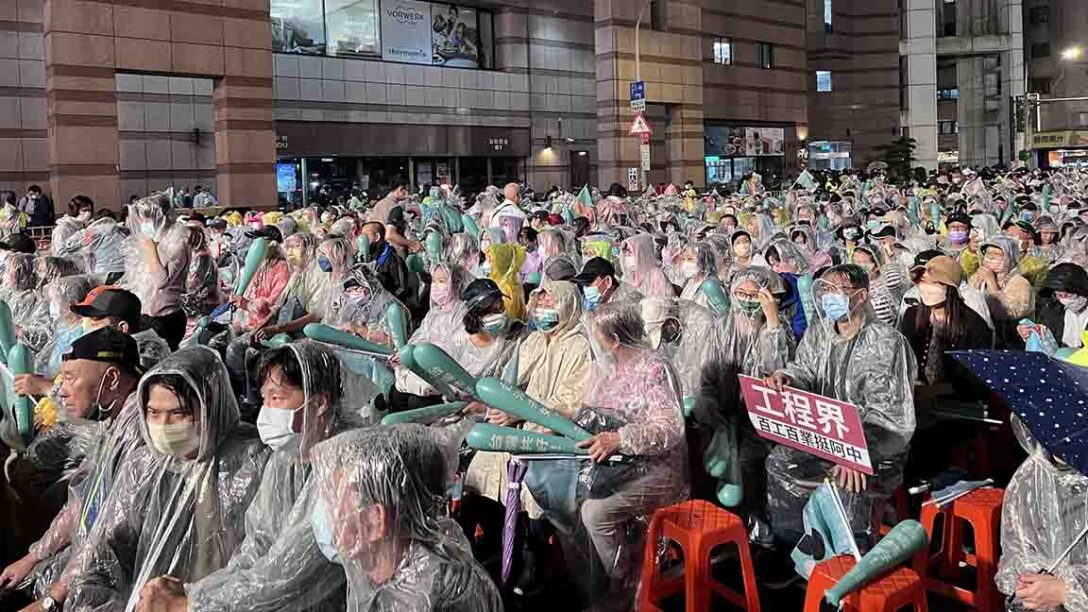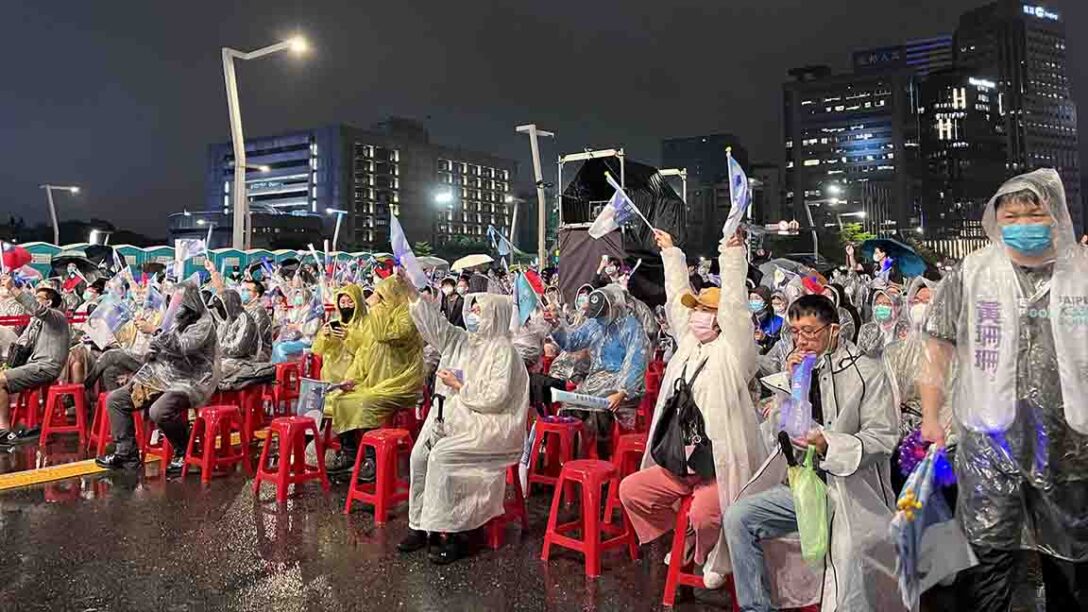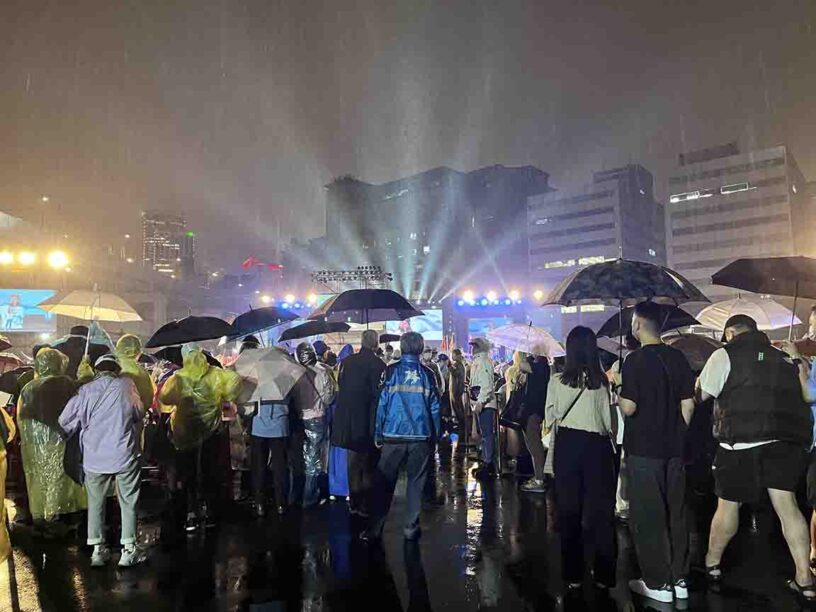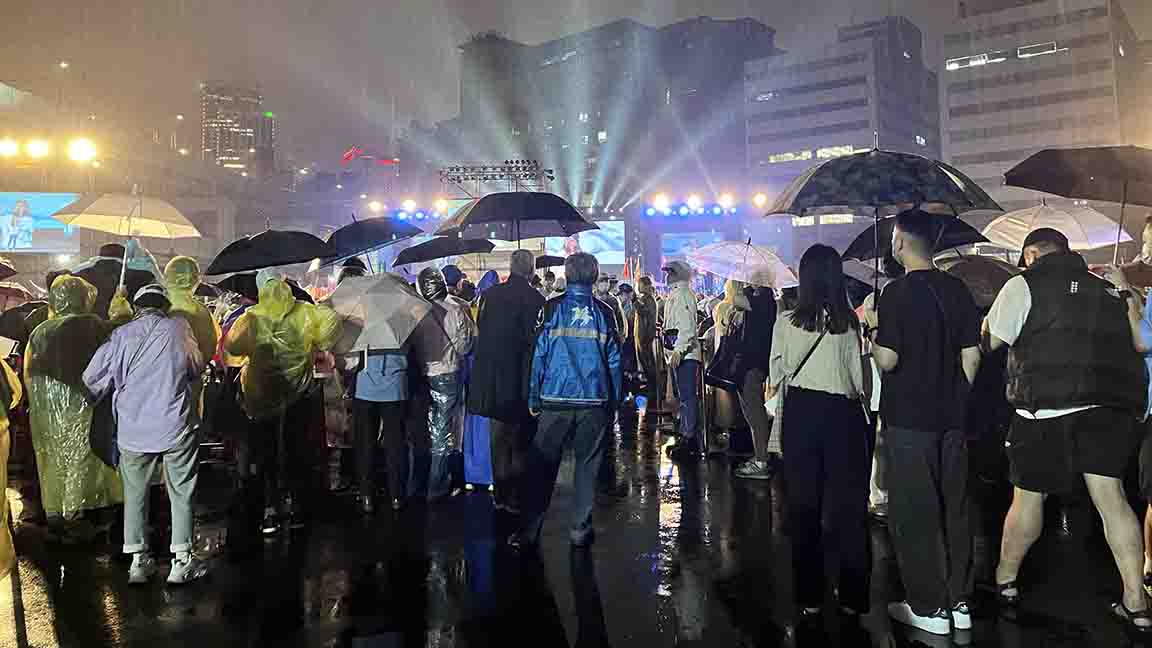November 25
Taipei
IT’S OFTEN RAINING when I embark on my usual election-night ritual in Taiwan: attending all the political rallies of all the major parties running in that year. It’s sort of like the world’s worst pub crawl. This year wasn’t as heated as many other elections, since it wasn’t a presidential election year; that will come in early 2024. The positions up for grabs were for the office of mayor, plus city and county councilors.
My plan was to move west to east through the city, and then double back to my neighborhood in western Taipei. First up was the Democratic Progressive Party (DPP), which was fielding former Minister of Health and Welfare Chen Shih-chung for mayor of Taipei.

The rally was held outside of DPP party headquarters near the Shandao Temple. Attendees were mostly older people, unsurprisingly; election rallies in Taiwan are always dominated by the elderly, and the speeches often feature dramatic musical accompaniment, to hype things up and invest things with a sense of spectacle.
The first act, an idol group, was too pitchy and sang out of tune. This was particularly audible on the large-scale sound system. I ran into an acquaintance running for city councilor but lost him in the throng before I could say hi. “That was the guy who interpreted for Pelosi,” I heard someone murmur nearby. I guess that’s what he’s known for now.
Next up was the Taiwan People’s Party (TPP), which is headed by incumbent Taipei mayor Ko Wen-je, and was fielding deputy mayor Huang Shan-shan to succeed Ko. This was the least advertised of all the rallies, and it was the smallest. But the composition of the rally was mostly young people, which surprised me, and suggested that Ko continues to be popular among Taipei’s youth. Likewise, I did not expect to see that they were handing out Republic of China (ROC) flags at the rally—I wouldn’t have expected that at a TPP rally a few years ago. That told me that the TPP was leaning harder into ROC nationalism than in the past, when the party previously positioned itself as having neutral views on identity contestation in Taiwan.

The TPP handed out the most merch by far, including flashing baubles, plastic balloons, and the aforementioned flags. What a waste of plastic, I thought.
Last, then, was the Kuomintang, whose mayoral candidate Chiang Wan-an is the purported great-grandson of Chiang Kai-shek. This was again an older crowd, but it was by far the largest rally, easily larger than the other two combined. OK, then, it looked like the Kuomintang would win the Taipei mayoral race. At the very least, the size of the crowd indicated strongly that the TPP really did not have a chance in the Taipei mayoral race, though there had been some earlier conjecture that the TPP and Kuomintang might divide the vote, resulting in a Chen victory.

Year after year, the main data points I get out of visiting election rallies the night before elections are turnout and the age of participants. These aren’t necessarily good predictors of election outcome though, since Taiwan doesn’t allow absentee voting and many voters live in different places from where they are registered to vote. That means that the night before elections, many may have already returned home to vote. I was probably most surprised by the young composition of the TPP rally.
By the time I finished with the Chiang rally, I and the friend I had been traipsing around Taipei with were soaked. We went to an izakaya and then a craft beer bar, waiting for three other friends who, as it happened, never showed up.
I knew that one of my Internet nemeses—whom I have never met in person—frequents that craft beer bar, but whatever. On my last visit, I had spent the entire night glowering at a man I thought was him, but who turned out to be a completely unrelated individual, also a regular at that bar. I now say hi to the man I mistook for my nemesis whenever I run into him there.
We ended up chatting with a random visitor from Pennsylvania who was vacationing in Taiwan, and we explained the election to him. Taiwan’s borders were only opened in October—it was strange to see tourists again. “That’s Team Evil over there,” I quipped, when he asked me about the nearby Chiang rally.
I was surprised that I didn’t run into any journalist colleagues at any of the rallies. And it generally seemed there wasn’t a lot of attention to the race this year from international media, either. The next day would also be a long one—I was scheduled to be on the radio in the afternoon, and after that I would have to run an election party, as well as file my report. Best not to be too hungover.
Thank you for visiting POPULA! Add your email here to receive our newsletter!






